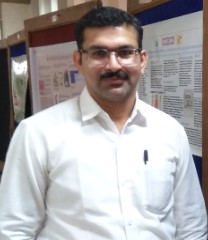
|
Dr.Venkanna BhanothuM.Tech., Ph.D., PDF.Scientist ‘C’ Department of Cell Biology
Email: [email protected] |
|---|
Dr Venkanna Bhanothu obtained his Master’s Degree in Biochemistry in the year 2004 and Master of Technology in Medical Biotechnology in the year 2006 from the University of Hyderabad, Hyderabad. The AICTE, Govt. of India that awards GATE fellowship has supported his M.Tech program. Dr. Venkanna Bhanothu obtained his Doctoral Degree (Ph.D) in Zoology from Osmania University, Hyderabad in the year 2016. His doctoral thesis relates to "Evaluation of the Molecular and Immunological Profile of Female Genital Tuberculosis (FGTB) Patients". The UGC-BSR Scheme, an initiative of the UGC, Govt. of India that awards research fellowships in sciences for meritorious students (RFSMS) supported his doctoral work. One of his major accomplishments during this time was the development of two modified molecular methods such as multi-gene/multi-primer PCR and ARMS-multi- gene/multi-primer PCR for the detection of Mycobacterium tuberculosis and gene polymorphisms in women with infertility.
For his postdoctoral research, Dr Venkanna Bhanothu was awarded the National- Post- Doctoral Fellowship by DST-SERB, Govt of India, and moved to the University of Hyderabad, Hyderabad, where he worked in the labs of Prof. Anand Kumar Kondapi from the year 2016 to 2018. During this time, he investigated “The Use of Pluripotent Human Embryonic Stem Cells as an In-Vitro Model for the Study of Neuronal Senescence”. He uncovered the status of topoisomerase‐2β protein in all‐trans retinoic acid-treated human neuroblastoma (SK‐N‐SH) cells and the human embryonic stem cell-derived neuronal cells. He was also awarded the ICMR Centenary-Post-Doctoral Fellowship by ICMR, Govt of India, and moved to ICMR-National Institute of Nutrition, Hyderabad, where he worked in the labs of Dr. Vijayalakshmi Venkatesan from the year 2018 to 2019. During this time, he investigated “The application of Human-Derived Embryonic Stem Cells to Study the Dynamics of Folic Acid and Vitamin B12 (Deficiency/ Supplementation) in Vasculogenesis- Recapitulation of Early Embryonic Development”. He uncovered the collective effect of restrictions and supplements of vitamins B6, B9, and B12 on human embryonic stem cell- derived embryoid bodies and suggested the reversal of damage may not be 100%.
Later on, Dr Venkanna Bhanothu joined the ICMR-National Institute for Research in Reproductive and Child Health (ICMR-NIRRCH), Mumbai as Scientist B in the year 2019 and was promoted to Scientist C in the year 2022. Dr.Venkanna Bhanothu was the part of analysis, and reporting and was one of the signing authorities of COVID-19 reports at ICMR- NIRRH from 24 April 2020 to 4 April 2024. As a Principal Investigator (PI), he has formulated several research projects at ICMR-NIRRCH, Mumbai. Out of which, the project entitled “Identification and Evaluation of Novel Metabolites with the Potential of Prenatal Diagnosis of Fetal Congenital Heart Diseases (2022-2025)” was sanctioned by DST-SERB, Govt of India. The project entitled “Molecular Profiling of Common Clinical Phenotypes Associated with Congenital Hypothyroidism (2023-2026)" was sanctioned by ICMR, Govt of India. Dr. Venkanna Bhanothu also has approval of the “Newborn Screening Program” by the scientific review committee (SRC) at ICMR-NIRRCH, Mumbai. This program has the potential for early detection and timely management of inborn errors of metabolic disorders and endocrine disorders. Dr. Venkanna Bhanothu was Co-PI for a major research project entitled “Mission Program on Pediatric Rare Genetic Disorders (Mumbai Chapter)” undertaken by CDFD, Hyderabad, and the project entitled “Establishment of Center for Maternal and Child Genetics” at ICMR-NIRRCH, Mumbai funded by DBT, Govt of India. Dr. Venkanna Bhanothu as a PI, author and co-author has generated significant new information and directions in designing the national policies, guidelines, and diagnostic approaches for solving public health issues related to the national interest.
Dr. Venkanna Bhanothu transferred to ICMR-NIN in the year 2024 and is currently working as Scientist C in the Department of Cell Biology. His present research involves addressing the role of micronutrients in embryonic development, child health, and reproductive failure in both in-vivo and in-vitro models. He is also working on nutritional interventions, metabolic and molecular aspects of congenital abnormalities (such as fetal congenital heart diseases, congenital hypothyroidism, etc.), and inherited metabolic disorders.